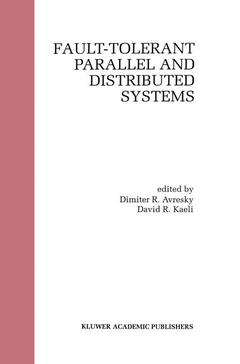Fault-Tolerant Parallel and Distributed Systems, Softcover reprint of the original 1st ed. 1998
Langue : Anglais
Coordonnateurs : Avresky Dimiter R., Kaeli David R.

The most important use of computing in the future will be in the context of the global "digital convergence" where everything becomes digital and every thing is inter-networked. The application will be dominated by storage, search, retrieval, analysis, exchange and updating of information in a wide variety of forms. Heavy demands will be placed on systems by many simultaneous re quests. And, fundamentally, all this shall be delivered at much higher levels of dependability, integrity and security. Increasingly, large parallel computing systems and networks are providing unique challenges to industry and academia in dependable computing, espe cially because of the higher failure rates intrinsic to these systems. The chal lenge in the last part of this decade is to build a systems that is both inexpensive and highly available. A machine cluster built of commodity hardware parts, with each node run ning an OS instance and a set of applications extended to be fault resilient can satisfy the new stringent high-availability requirements. The focus of this book is to present recent techniques and methods for im plementing fault-tolerant parallel and distributed computing systems. Section I, Fault-Tolerant Protocols, considers basic techniques for achieving fault-tolerance in communication protocols for distributed systems, including synchronous and asynchronous group communication, static total causal order ing protocols, and fail-aware datagram service that supports communications by time.
Preface. Part I: Fault-Tolerant Protocols. 1. Comparing Synchronous and Asynchronous Group Communication; F. Cristian. 2. Using Static Total Causal Ordering Protocols to Achieve Ordered View Synchrony; K.-Y. Siu, M. Iyer. 3. A Failure-Aware Datagram Service; C. Fetzer, F. Cristian. Part II: Fault-Tolerant Distributed Systems. 4. Portable Checkpoint For Heterogeneous Architectures; V. Strumpen, B. Ramkumar. 5. A Checkpointing-Recovery Scheme for Domino-Free Distributed Systems; F. Quaglia, et al. 6. Overview of a Fault-Tolerant System; A. Pruscino. 7. An Efficient Recoverable DSM on a Network of Workstations: Design and Implementation; A.-M. Kermarrec, C. Morin. 8. Fault-Tolerant Issues of Local Area MultiProcessors (LAMP) Storage Subsystem; Q. Li, et al. 9. Fault-Tolerance Issues in RDBMS on SCI-Based Local Area MultiProcessor (LAMP); Q. Li, et al. Part III: Dependable Systems. 10. Distributed Safety-Critical Systems; P.J. Perrone, B.W. Johnson. 11. Dependability and Other Challenges in the Collision Between Computing and Telecommunication; Y. Levendel. 12. A Unified Approach for the Synthesis of Scalable and Testable Embedded Architectures; P.B. Bhat, et al. 13. A Fault-Robust SPMD Architecture for 3D-TV Image Processing; A. Chiari, et al. Part IV: Fault-Tolerant Parallel Systems. 14. A Parallel Algorithm for Embedding Complete Binary Trees in Faulty Hypercubes; S.B. Choi, A.K. Somani. 15. Fault-Tolerant Broadcasting in a K-ary N-cube; B. Broeg, B. Bose. 16. Fault Isolation and Diagnosis in Multiprocessor Systems with Point-to-Point Communication Links; K. Chakrabarty, et al. 17. An Efficient Hardware Fault-Tolerant Technique; S.H. Hosseini, et al. 18. Reliability Evaluation of a Task Under a Hardware Fault-Tolerant Technique; O.A. Abulnaja, et al. 19. Fault Tolerance Measures for m-ary n-dimensional Hypercubes Based on Forbidden Faulty Sets; J. Wu, G. Guo. 20. Dynamic Fault Recovery for Wormhole-Routed Two-Dimensional Meshes; D.R. Avresky, C.M. Cunningham. 21. Fault-Tolerant Dynamic Task Scheduling Based on Dataflow Graphs; E. Maehle, F.-J. Markus. 22. A Novel Replication Technique for Implementing Fault-Tolerant Parallel Software; A. Cherif, et al. 23. User-Transparent Checkpoint and Restart for Parallel Computers; B. Bieker, E. Maehle. Index.
The most important uses of computing in the future will be those related to the global `digital convergence' where all computing becomes digital and internetworked. This convergence will be propelled by new and advanced applications in storage, searching, retrieval and exchanging of information in a myriad of forms. All of these will place heavy demands on large parallel and distributed computer systems because these systems have high intrinsic failure rates. The challenge to the computer scientist is to build a system that is inexpensive, accessible and dependable. The chapters in this book provide insight into many of these issues and others that will challenge researchers and applications developers. Included among these topics are: + Fault-tolerance in communication protocols for dis
Date de parution : 10-2012
Ouvrage de 401 p.
15.5x23.5 cm
Disponible chez l'éditeur (délai d'approvisionnement : 15 jours).
Prix indicatif 158,24 €
Ajouter au panierThème de Fault-Tolerant Parallel and Distributed Systems :
Mots-clés :
Scala; Scheme; image processing; processor; reliability; scheduling
© 2024 LAVOISIER S.A.S.



